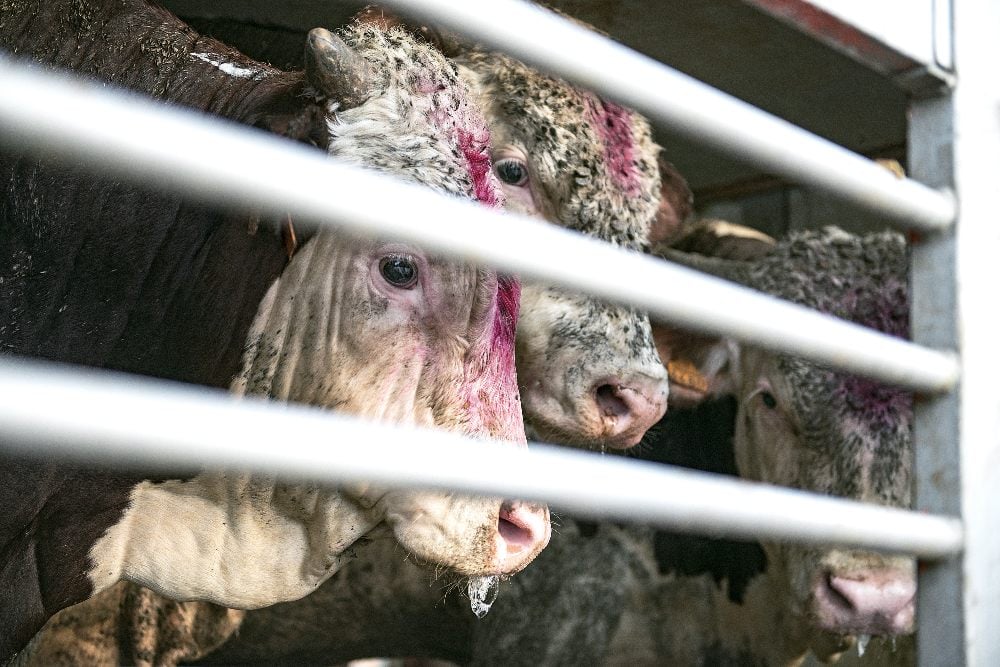Craig Whitney grew up with a childhood familiar to many others living in the Australian Countryside. His father was a third generation farmer living in Bonalbo NSW.
“It’s common for kids to follow their dads around the farm. To learn his ways and stick by his side,” he told Plant Based News.
At the ripe age of four, Whitney had already witnessed dogs being shot in front of him and cattle being branded, castrated and de-horned. “It kind of became a normalized part of my life” he admitted. As he grew older his father began to discuss Whitney looking after the farm as a fourth generation farmer.
A common pattern
This pattern seems to be all but too common to many Australian farmers today.
According to Australian Farms Association: “The Majority of farms in Australia are still family owned businesses and there are some farms that have been passed down in the family for generations.”
Whitney managed to escape this pressure when he entered the world of foster care due to complications in his family.
Cattle abattoir
At the age of 19, Whitney was convinced by a few friends to join them in working at a cattle Abattoir in Western NSW. At the time he was in need of work and the idea of ‘working with mates’ seemed appealing.
“My first job was working as a ‘floor boy’ on the kill floor,” Whitney says. He admits working in this role was high risk in regards to safety.
“I spent most of the time dodging bodies as I tried to mop the floor clean from all the blood. Cows killed seconds earlier would have their hind legs chained up and would have their throat slit. They would move quite quickly on the assembly line towards me.”
Close class
Whitney remembers having multiple close calls due to ‘cows lashing out from nerve twitches whilst hooked up by chains’.
Cows lashing out after slaughter is common and in February of this year a man was hospitalized in Germany with serious face injuries after a cow kicked him in the face due to a nerve impulse after being killed. In a statement police said the cow was ‘killed according to Industry regulations’.
Some of the worst moments during Whitney’s years of work where when ‘cows escaped from the ‘knocker box’ once their throat had already been slit.
They ran on pure adrenaline and fear onto the blood rail and had to be shot’. Whitney admitted that every now and then when a cow hadn’t ‘had their throat slit correctly’ they would be fully conscious during their ‘bleed out’.
Working fast
During his time at work Whitney was often forced to work faster than usual to meet the daily quota necessary. “With the drought going on right now (In Australia) I’m sure it would be full steam ahead. There’s more demand than there is supply so it all about killing as many animals as fast as possible (to maximize) profit’.
“There have always been injuries in every abattoir I’ve worked in. There were many times where I nearly lost my own fingers. With saw operators (the saying goes) always count your fingers.”
Most shockingly Whitney witnessed a workmate loose his entire hand whilst following standard industry practices.
Dangerous work
It appears these aren’t isolated cases of workers being seriously injured. In 2010, a 34-year-old Indian migrant Sarel Singh was decapitated whilst at work in a Melbourne chicken Slaughterhouse.
According to the Daily Mail: “Mr. Singh was killed instantly when he was sucked into a fast-moving machine after being ordered to re-clean a packing area.”
Andy Meddick addressed this incident in a speech in parliament this year representing the Animal Justice party. “Workers were ordered to return to work only hours after the blood of Sarel Singh was wiped from the machinery,” he said.
Whitney admits: “I felt sick in the stomach at first. But it was a job and I needed money. It was paying my rent at the time. After a while I got used to it and saying that now makes me feel horrified.”
‘Gateway to Australia’
According to Whitney the majority of his work colleagues were Chinese, Indian or Sudanese and were on a 457 Temporary work (Skilled Visa).
“70 percent of my workmates were migrants and many had families who wanted a better life in Australia. After working for four years in the slaughterhouse they would quit because by then they’d earned their Australian citizenship,” he said. “It’s a gateway to get into Australia.”
According to Whitney the industry is always looking for more workers. “There’s always work. The industry always was, always is and always will be screaming for workers. Look up any abattoirs in Australia and you’ll find work.
“They say you put 10 on and another 20 quit.”
Employees
When it comes to being hired it seems no one is concerned about looking into a potential employees background.
During his recruitment process Whitney was never asked if he had a criminal record and was shocked to discover many of his workmates were hired despite having a history of domestic violence, arson attacks or a history of drug abuse. “The industry does not care about your background. As long as you turn up and get the job done you’ll be hired,” he said.
According to Psychologist Clare Mann, Spatial Economist Dr. Steve Garlick discovered slaughterhouses are often built in areas close to Australian prisons. By doing so, people leaving prison hoping to assimilate back into society could easily find work at an abattoir since work was always available and close to home.
A downfall to this was ex-prisoners often found themselves falling back into violent behaviour. Garlick refers to this as ‘the revolving door of violence’.
Violent crime
A 2010 study by Canadian criminologist Amy Fitzgerald found violent crimes including sexual assault and rape increase in towns once an abattoir opened.
Professor Fitzgerald says: “It wasn’t the nature of repetitive and dangerous work, but the act of slaughtering an animal that was to blame for the increase in violence.”
Shockingly, Karnet Prison Farm in Western Australia is a prison dedicated to teaching prisoners to slaughter and process animals. Its website claims the facility ‘focuses on preparing prisoners for successful re-entry into the community when they are released, giving them job skills linked to agricultural production. The prison breeds cattle and sheep and has an abattoir, dairy, poultry farm, market gardens and an orchard’.
Drug use
During his years of work, Whitney was also surprised by the use of heroin, cocaine and marijuana. “Workmates would get high on lunch break to try and numb themselves…It’s not until you see the fear in a cow’s eyes as they’re unloaded one by one. That’s when it all becomes too real.”
During his years working in the Australian Animal Agriculture Industry, Whitney was flown around the world to work with Industries Internationally.
He admitted: “People seem to think that Australian standards are higher than other countries in the world. But at the end of the day every animal is being slaughtered and slaughterhouses globally are very similar.”
Quitting for good
In 2013, Whitney quit the industry for good: “People don’t go public about it. They get another job and quit the industry and that’s the end of it. The industry might come after me for exposing what I am. Its taken me a while to step up and speak out.”
In 2018, Whitney became vegan after having a mental breakdown and suffering from PTSD (Post traumatic stress disorder).
When he met some animal rights activists his life took a turn for the better. In a recent Instagram post he wrote: “This is what I dream about now. Activists liberating animals and freeing them from enslavement. Better than nightmares of precious babies having their throats cut for consumer addiction.”
Whitney concluded: “If you know anyone working in the Industry encourage them to speak out and seek help. The best way to help slaughterhouse workers is to stop supporting industries that exploit animals by cutting out meat, eggs and dairy.”






